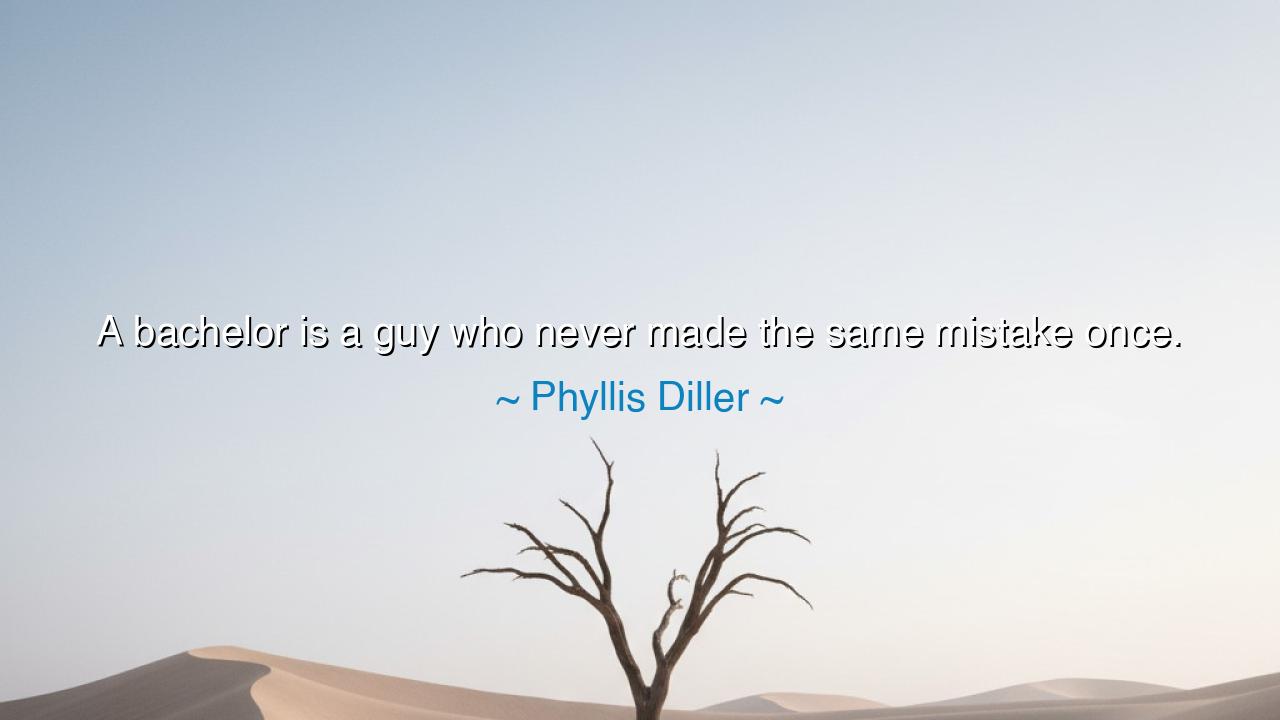
A bachelor is a guy who never made the same mistake once.






Hear the sharp wit of Phyllis Diller, who clothed wisdom in laughter and declared: “A bachelor is a guy who never made the same mistake once.” At first, her words seem but a jest, a lighthearted jab at marriage and the men who avoid it. Yet beneath the humor lies a reflection on human nature, on the lessons of love, and on the peculiar ways we define error and wisdom. For comedy often unveils truth with greater clarity than solemn speech.
The essence of the saying rests in the idea of mistake. Diller implies that to marry is to make a mistake—one not fatal, but binding, demanding, and often regretted in moments of difficulty. Yet the bachelor, in his freedom, has made no such repetition. He has, perhaps, loved, perhaps dallied, perhaps courted; but he has not sealed his fate with vows. He is the man who sees the flame and chooses not to place his hand into it again. In this, the humor lies in calling marriage itself the “same mistake,” a mistake avoided by remaining unmarried.
Yet there is irony, for the bachelor is not free from folly either. His so-called wisdom may be a form of cowardice; his refusal to risk may itself be another kind of error. To love deeply, to commit, to endure the struggles of a lifelong bond—these are not mistakes but trials through which the soul grows. The bachelor, in never repeating the “mistake,” may also never taste the depth of love’s endurance. Thus, the humor of Diller’s words cuts both ways, mocking marriage while slyly mocking bachelorhood too.
History provides examples of this tension. Consider the great philosopher Immanuel Kant, who never married. He lived in discipline and order, his life a clockwork of study and reflection. By Diller’s measure, he avoided the “mistake” of marriage, but perhaps also missed the fire of intimacy that tempers and deepens the soul. On the other hand, consider Napoleon Bonaparte, who married Josephine, found in her both passion and betrayal, and yet chose to wed again with Marie Louise, seeking dynasty and legitimacy. He made the “same mistake twice,” and in so doing revealed how men are often willing to risk heartbreak for the chance of love or ambition fulfilled.
The quote also reminds us that humor has long been the cloak of truth. In ancient Greece, Aristophanes used comedy to ridicule the follies of men and women alike, exposing the contradictions of society through laughter. Diller stands in this tradition, using wit to suggest that human beings are bound to folly whether they marry or not; the difference lies only in which folly they choose. The sadness she names in jest is that men rarely learn from experience—they simply cloak their choices in pride, whether in the name of commitment or the name of freedom.
The lesson here is not that marriage is a mistake, nor that bachelorhood is wisdom, but that human beings must learn to see their choices with humility. Whether married or unmarried, one must recognize that life is filled with risks, and that love always demands sacrifice. The so-called “mistake” is not in marrying or not marrying, but in failing to live fully, failing to love honestly, or failing to learn from one’s own past.
Practical is this counsel: if you marry, do so not blindly, but with eyes open to the labor, the patience, and the endurance it requires. If you remain single, do not hide behind pride or fear, but find other ways to love, to grow, and to share your life with others. And in either path, let laughter accompany you, for humor softens regret and teaches us to hold lightly the burden of our choices.
So remember Phyllis Diller’s words: “A bachelor is a guy who never made the same mistake once.” Laugh, yes, but also listen. For in the jest is the reminder that all men err, all men stumble, and that the true measure is not in avoiding mistakes, but in how we rise, how we love, and how we grow wiser even as we continue, inevitably, to fall.






AAdministratorAdministrator
Welcome, honored guests. Please leave a comment, we will respond soon